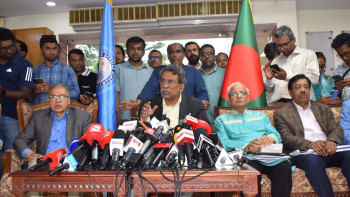With confidence we move ahead

We see the back of 2016 and soak up the freshness of the dewy dawn of a new year. The year gone by, however, has left the world at a precipice of uncertainty, graver perhaps than it has experienced before. What a turbulent year 2017 may be internationally! Bangladesh is no stranger to global turmoil, especially of the economic meltdown type.
In the coming year though, Trump's unsettling theories on recasting US' relationships with Russia, Europe, China, Middle East, Mexico and Iran could put the traditional geo-political equations under strain. In the unlikely event that it happens in a potentially game-changing manner, Bangladesh must keep its antenna high on such an unfolding scenario. She needs to keep her analyses ready to respond to short-sighted impulses in the international arena without compromising her principled positions.
Having said that, we rejoice in the fact that our hard-earned national independence 45 years ago has been redeemed by our remarkable socio-economic progress outstripping that of Pakistan. We have to traverse some more distance to remove economic inequalities towards building an egalitarian society in honour of the freedom fighters, dead or living. Yet in meeting such a solemn obligation, we can claim to have made some tangible headway.
The country is doing significantly better than Pakistan in human development indicators and in some cases India as well. According to the Human Development Report (HDI-2015), life expectancy at birth in Bangladesh stood at 71.6 years compared with 66.2 and 68 years respectively in Pakistan and India. On the human capital index of the World Economic Forum Bangladesh is placed 104th among 130 countries with Pakistan trailing at 118th position.
With food autarky having been achieved, the latest global hunger index placed Bangladesh in a better position. Its score at 27.1 this year marked an improvement from 32.4 in 2008. Over the same period Pakistan's score declined to 33.4 from 35.1 and India's to 28.5 from 36.
As part of the chain effect, Bangladesh has the second best country brand value in South Asia after India.
Be it competitiveness or innovation or reduction in gender discrimination indices Bangladesh is ahead of Pakistan, although the latter has crossed 70 years since its independence.
Whether in GDP growth rate or poverty alleviation or the size of Forex reserve that country is lagging behind us.
While the economy has become vibrant its structure too has changed. Where agriculture was dominant contributing 60 percent to the economy, now industry and service sector are coming up steadily. Jute's place as a major export—up to 65 percent-- has been taken up by garments. Per capita income of once a meagre USD 50-60 has shot up to USD 1,465. Indeed, as Zahid Hossain, chief economist of the World Bank, Dhaka office puts it, "A small industrial revolution has taken place in Bangladesh."
In addition, our scientists, sportsmen and women and adventure-lovers keep stunning the world with their achievements. Discovery of five pairs of stars bigger than the Sun, jute genome, cholera forecast, electricity without fuel, winning Oscar twice, co-founding of youtube – to name only the major ones. The list can be multiplied annually, such is the growing profile of positive Bangladesh!
With such upbeat and eye-catching performances how do we reconcile to GDP growth-whittling corruption, hideous traffic congestion, highway accidents and violence? How do we explain our highest per km flyover cost at Tk. 123-250 crore when resourceful countries like China, Malaysia and India manage it at a much lower cost? Cost escalations in our development works are a shameful reflection of mis-planning, and malpractice. For instance, it does not pain us to see 'no let-up in woes of city women commuters' as an English daily poignantly brought up recently.
We have come to a stage in our national life where we have to deal with successes and failures with equanimity, objectivity, and more importantly, ownership. We must do it in a way that the fruits of successes are preserved, built up on, enhanced and shared whilst the latter are phased out duly backed by collective will of the stakeholders.
Success stories give us a leap of the mind and a spring to our feet, inspiring us to scale newer heights so that replication may not be an issue there. But repeated pitfalls are depressive where no magic formula will work except determined doses of political will.
The writer is a current affairs commentator and former Associate Editor of The Daily Star.
E-mail:[email protected]

 For all latest news, follow The Daily Star's Google News channel.
For all latest news, follow The Daily Star's Google News channel. 



Comments